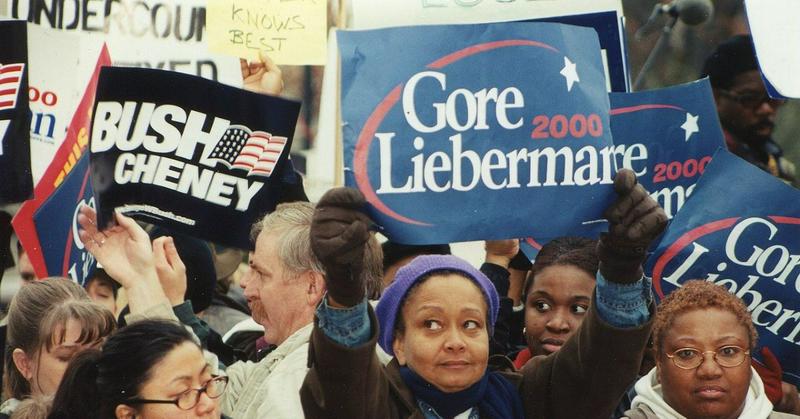How Long Did The 2000 Presidential Election Results Take? A Look Back At The Last Contentious U.S. Presidential Election
By | October 22, 2020

What happened in the 2000 presidential election? Decades after the event that left Americans weary of the term "hanging chad," the dealings that led to the George W. Bush presidency are still murky. After three weeks of arguing over 537 votes, the state of Florida decided that Bush won the night, handing over its 25 electoral votes, but that was after a wild election night, a rescinded concession, and an argument over the popular vote which has hounded American politics ever since. How was the 2000 presidential election decided between George W. Bush and Al Gore? We'll break it down so it all (mostly) makes sense.
Too Early To Call
The surprise wasn't that Gore and Bush were locked in a close race—that made sense to everyone. Gore was running on a platform that was slightly further left than his predecessor's, and Bush's campaign struck all the right notes for the G.O.P. There was genuine excitement leading up to the 2000 election, but poll after poll showed voters in a deadlock, so possibly out of fatigue, networks called the election for Gore as early as 8:00 P.M. E.T. on election night.
Rather than put the matter to rest, however, all hell broke loose. Karl Rove, then-governor Bush's chief strategist, called Fox News himself, insisting that the election wasn't over because Florida was still counting their ballots and the decision to announce Gore as the winner was based on skewed exit polls of young people, women, and voters of color. After Rove's call to Fox, news organizations began reversing their decisions or waiting to call the election until they had a definite answer.

It Had To Be Florida
The race was tight across the country, but in 2000, Florida emerged as a must-win state for the presidency. As far as swing states go, Florida is the swingiest, with no real voting consistency. Even though we think of Florida as a conservative stronghold post-2000, it was a key factor in Obama's victories in the 2008 and 2012 elections, so even today, guessing how Florida is going to play out is a fool's errand.
In 2000, Gore won the popular vote on a national scale but needed Florida's electoral votes to win the election. The networks initially announced that Gore won the Sunshine State, but they changed their tune to announce a lead for Bush later in the evening. They seemed so sure that Gore conceded the election, but after it was announced that fewer than 600 votes separated the candidates, Gore retracted his concession at about 3:00 A.M. on November 8.

The Supreme Court(s)
The day after the election, the Florida Division of Elections named Bush the winner by 1,784 votes, but Florida law dictates that such a small margin of victory triggers an automatic machine recount. When the machine was through with it, Bush's lead dropped to 327 votes. If you're confused, you're not alone.
The machine recount proved to be disastrous, with 170,000 ballots marked unreadable either by undervotes, caused by the voter's failure to fully perforate the specific box, or overvotes, when voters tick the right box but then also write in the name of the person they were voting for. The Gore campaign requested a hand recount in four heavily Democratic counties, and the Bush campaign sued to stop it.
Gore initially got his recount, but not the kind that he wanted. On December 8, the Florida Supreme Court ordered a statewide hand recount of undervotes, which was already underway when the U.S. Supreme Court stopped it cold on December 12, declaring that inferring voter intent based on one specific approach was unconstitutional because different counties used different methods.

Gore Would Have Won
Gore could have requested a statewide recount with specific standards but worried the decision would create mass turmoil, so he backed off and conceded to Bush in a speech delivered from a ceremonial office next to the White House on December 13, 2000. Earlier, he had called President-Elect Bush to offer his congratulations and joked that he wouldn't call him back, referencing the 3:00 A.M. phone call from more than a month prior. Following a hand recount funded by some of the nation's biggest news outlets, the National Opinion Research Center at the University of Chicago revealed that Gore actually took the election regardless of voting standards by a margin of 60–171 votes.

